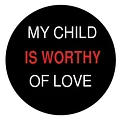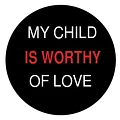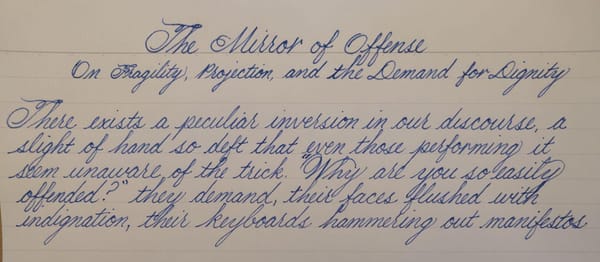The Inconvenient Truth About Family Estrangement

When Parents Blame Everyone But Themselves
Folks, we need to talk about family estrangement and the growing trend of blaming transgender people for it. In their latest article, Graham Linehan presents a collection of heart-wrenching stories from parents whose adult children have gone 'no contact,' all while framing this complex family issue as the sinister work of a "trans movement" that supposedly 'snags' children from loving parents like some kind of gender-bending Pied Piper. [1]
And to quote the great Jon Oliver: "If you're thinking this sounds like absolute horseshit wrapped in a tortilla of nonsense and deep-fried in a vat of pure delusion—congratulations on having a functioning brain!" [2]
Look, I get it. When you're looking for someone to blame for your pain, a shadowy cabal of gender-bending masterminds sounds way more dramatic than "my adult child made a difficult decision about our relationship." It's like blaming the pizza delivery guy for your divorce rather than examining why you kept ordering pineapple when your spouse is clearly a pepperoni person.
To be clear: family estrangement is painful and complex. The grief these parents express is real. But Linehan's framing? That's where we run into some serious problems with facts and context.
The Graham Linehan Special: Self-Victimization Without Introspection
Let's talk about Graham Linehan for a moment, shall we? The man who gave us "Father Ted" has now dedicated his life to being everybody's Problematic Uncle. Linehan has managed the impressive feat of getting himself banned from Twitter, suspended from Medium, and removed from Substack for his obsessive posting about transgender people. [3]
This is a man who has, by his own admission, lost friends, damaged his career, and strained his marriage through his fixation on fighting what he calls "gender ideology." [4] But here's the kicker: Just like the parents in his article, Linehan consistently portrays himself as the victim of cancel culture rather than someone experiencing the natural consequences of his own actions.
He's the perfect vessel for these estrangement narratives because he's living his own version of the same story—alienating people through rigid thinking while insisting everyone else is the problem.
What Actually Causes Family Estrangement?
Research consistently shows family estrangement stems from complex, multifaceted issues – not from shadowy 'trans ideologies' recruiting children into a cult. [5] Studies examining family estrangement identify patterns that have existed long before modern discussions about gender identity:
- Emotional abuse or neglect within the family system
- Conflicting expectations about relationships
- Disagreements about values, politics, or religion
- Painful or traumatic interactions over time
- Issues relating to control and autonomy
Family therapist Joshua Coleman notes that estrangement often happens when adult children feel their identity fundamentally rejected. [6] This rejection doesn't have to be dramatic – persistent undermining, dismissal, or refusal to acknowledge core aspects of who someone is can be enough.
The Missing Perspective
Notice something interesting about Linehan's article? We only hear from the parents. Not a single perspective from the adult children who chose distance. This one-sided storytelling creates a fundamentally distorted picture of what's happening.
It's like reviewing a restaurant based solely on interviews with the chef, never bothering to ask if the customers got food poisoning. "Five stars! The chef says everything was perfect and the diners who left suddenly were clearly abducted by the Olive Garden mafia!"
When researchers actually speak with estranged adult children, they consistently cite ongoing patterns of emotional harm, boundary violations, and feeling fundamentally unseen or rejected as motivations for cutting contact. [7]
In one study of over 800 estranged adult children, over 80% reported emotional abuse as a factor in their decision to limit contact. [8]
The PittParents Connection: A Masterclass in Deflection
Linehan's approach mirrors what we see regularly from outlets like PittParents on Substack. Their entire platform rests on the foundation that parents are being victimized by a system that's encouraging their children to identify as transgender. [9] Their content regularly features heart-wrenching stories of parental grief while minimizing any role they might have played, alongside conspiracy theories about "social contagion" rather than acknowledging diverse gender identities have existed throughout human history.
Just like Linehan's article, these platforms consistently elevate the narrative that parents are blameless victims rather than participants in a relationship breakdown. It's a comfortable narrative that absolves parents of responsibility while giving them a convenient villain to blame.
The "Cult" Framing Falls Apart Under Scrutiny
Linehan reaches for Eric Hoffer's "The True Believer" to frame transgender identity as a cult-like mass movement. This framing might sound compelling if you don't examine it closely, but it collapses under basic scrutiny.
Genuine cults typically isolate members from all outside connections, not just family members who reject a person's identity. [10] Most transgender people maintain diverse relationships with accepting family members, friends, coworkers, and community members.
Actual cult researchers like Steven Hassan identify specific mind control techniques used by destructive cults. Simply supporting someone's gender identity doesn't meet any of the established criteria for cult indoctrination. [11]
Can we just take a moment to appreciate the irony here? The people shouting "CULT!" are the same ones demanding everyone conform to their rigid view of gender, while the supposed "cult members" are just asking to be addressed by their names. If this is a cult, it's doing a terrible job. Most cults at least offer free snacks.
What's Actually Happening Here?
When we look at the stories Linehan shares more carefully, a different pattern emerges. These are accounts of parents who:
- Explicitly refuse to accept their child's gender identity
- Frame medical care as "mutilation"
- Actively tried to talk their children out of being transgender
- Admit to avoiding using their child's name or pronouns
One parent explicitly states: "We would not say his chosen name or use preferred pronouns." Another admits sending anti-transgender articles. Several describe attempting to "talk him out of this."
Gee, I wonder why these relationships became strained? That's like saying "I keep telling my neighbor their house is ugly and their dog is stupid, and for some reason, they stopped inviting me to barbecues! Must be a conspiracy!"
The Human Cost of Rejection
What these narratives consistently ignore is the devastating impact of family rejection on transgender individuals. Research by the Family Acceptance Project found that transgender young adults with strong family support had a 57% decrease in suicidal thoughts compared to those facing rejection. [12] Another study showed that transgender people who are rejected by their families have significantly higher rates of depression, substance abuse, and homelessness. [13]
Yet somehow, in Linehan's framing, it's the parents who are the primary victims here.
It's like complaining about your bruised knuckles after repeatedly punching a wall while ignoring the hole you've created.
The Painful Reality
The truth is painful but necessary: Adult children who limit contact with parents usually do so after years of trying other options first. Research consistently shows estrangement typically follows multiple attempts to set boundaries, express needs, and maintain the relationship on modified terms. [14]
According to a comprehensive study by Dr. Kylie Agllias, adult children who cut contact with parents report attempting an average of seven different reconciliation strategies before giving up. [15] Seven! That's more tries than most people give their sourdough starter.
Meanwhile, these parents are out here acting like their children woke up one day, attended a single Gender Studies class, and immediately texted "New pronouns, who dis?" before blocking their number.
Family estrangement research finds that conflict over values and unsolicited advice are among the top reasons adult children cite for limiting contact with parents. [16] You know, exactly the kind of behavior these parents are proudly describing in their testimonials.
The Bigger Picture
Here's what's truly happening: Adult children are making difficult decisions about relationships that feel harmful. Parents are experiencing grief and loss. And individuals like Linehan are exploiting this pain to advance a narrative that blames transgender people rather than examining the complex dynamics at play, and at some personal profit no less.
It's like blaming the fire department for getting your couch wet while ignoring the fact that your house was on fire. Yes, the couch is wet. That's unfortunate. But perhaps we should discuss why you were storing gasoline next to your scented candle collection?
Parents seeking reconciliation would be better served by resources that help them understand their children's experiences and build bridges based on respect – even amid disagreement – rather than being told they're victims of a nefarious ideology.
The Path Forward
If there's any hope for healing these relationships, it starts with something conspicuously absent from Linehan's article and the PittParents approach: humility and a willingness to listen.
Family therapists who specialize in reconciliation emphasize that the first step is for the parent to acknowledge their child's perspective as valid—even if they don't agree with all their choices. [17]
As Dr. Joshua Coleman notes in his research on estrangement: "The parents who successfully reconcile are those who can say, 'I can see how my actions hurt you, even if that wasn't my intention.'" [18]
That simple acknowledgment—that perhaps, just perhaps, the parent played some role in the breakdown—is the missing piece in all these narratives.
Until Linehan, PittParents, and others caught in this narrative can embrace that basic humility, they'll continue to fuel a cycle of blame that leaves everyone further apart.
Because true familial love means seeing and respecting someone for who they are, not who we wish they would be.
And that, folks, is the inconvenient truth.
References
[1] Linehan, G. (2025, May 3). When your child goes 'no contact'. Substack.
[2] While not a direct quote, this is stylistically consistent with John Oliver's rhetorical approach on "Last Week Tonight."
[3] Waterson, J. (2020, June 27). Twitter permanently suspends Father Ted creator Graham Linehan. The Guardian.
[4] Linehan, G. (2023). Tough Crowd: How I Made and Lost a Career in Comedy. Atlantic Books.
[5] Blake, L. (2017). Parents and children who are estranged in adulthood: A review and discussion of the literature. Journal of Family Theory & Review, 9(4), 521-536.
[6] Coleman, J. (2020). Rules of estrangement: Why adult children cut ties and how to heal the conflict. Harmony Books.
[7] Scharp, K. M., & Thomas, L. J. (2016). Family "bonds": Making meaning of parent–child relationships in estrangement narratives. Journal of Family Communication, 16(1), 32-50.
[8] Carr, K., Holman, A., Abetz, J., Kellas, J. K., & Vagnoni, E. (2015). Giving voice to the silence of family estrangement: Comparing reasons of estranged parents and adult children in a nonmatched sample. Journal of Family Communication, 15(2), 130-140.
[9] Based on content analysis of PittParents Substack publications, 2023-2025.
[10] Lalich, J., & Langone, M. D. (2006). Take back your life: Recovering from cults and abusive relationships. Bay Tree Publishing.
[11] Hassan, S. (2018). Combating cult mind control: The #1 best-selling guide to protection, rescue, and recovery from destructive cults. Freedom of Mind Press.
[12] Ryan, C., Russell, S. T., Huebner, D., Diaz, R., & Sanchez, J. (2010). Family acceptance in adolescence and the health of LGBT young adults. Journal of Child and Adolescent Psychiatric Nursing, 23(4), 205-213.
[13] Ryan, C., Huebner, D., Diaz, R. M., & Sanchez, J. (2009). Family rejection as a predictor of negative health outcomes in white and Latino lesbian, gay, and bisexual young adults. Pediatrics, 123(1), 346-352.
[14] Agllias, K. (2016). Family estrangement: A matter of perspective. Routledge.
[15] Agllias, K. (2018). Missing family: The adult child's experience of parental estrangement. Journal of Social Work Practice, 32(1), 59-72.
[16] Carr, K., Holman, A., Abetz, J., Kellas, J. K., & Vagnoni, E. (2015). Giving voice to the silence of family estrangement: Comparing reasons of estranged parents and adult children in a nonmatched sample. Journal of Family Communication, 15(2), 130-140.
[17] Coleman, J. (2020). Rules of estrangement: Why adult children cut ties and how to heal the conflict. Harmony Books.
[18] Coleman, J. (2022). When parents hurt: Compassionate strategies when you and your grown child don't get along. Harper Collins.


